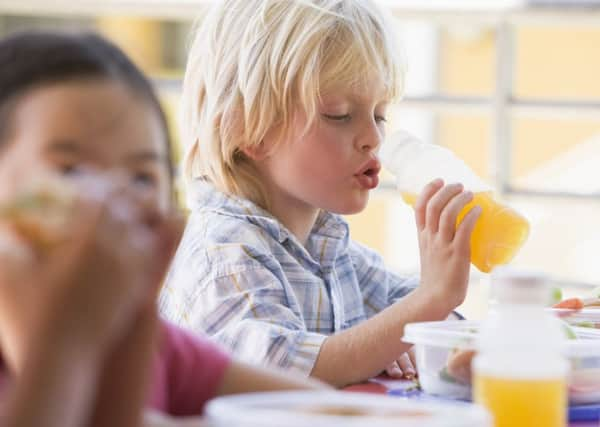Fruit juice to be axed in school meals overhaul


The Scottish Government also wants to introduce lower sugar limits on foods such as cereal and yoghurts and limits on processed meat such as ham, as part of efforts to tackle childhood obesity and health.
Ministers are consulting on the proposals, which were drawn up following a review by health, nutrition and education experts which began in March last year.
Advertisement
Hide AdAdvertisement
Hide AdThe report, aimed at changing guidelines for the 366,000 daily meals educational establishments provide for children in Scotland, was due to be published in late summer, but was delayed due to the “complexities” of reforming school nutritional standards. The plans also include reducing how often sweetened and baked goods are available in primary schools, a new regulation specifying how much red meat children should eat over a week and advice to those serving school lunches to adjust portion sizes depending on the age of the child.
Oily fish must be provided at least once every three weeks, while youngsters should be provided with one portion of fruit every day.
The proposals would also lower the amount of fat and sugar which should be contained in an average day’s primary school lunch.
First Minister Nicola Sturgeon has pledged to cut childhood obesity in Scotland by half by 2030. Almost a third of Scottish children are at risk of being overweight, with 14 per cent at risk of obesity, according to the latest figures. Deputy First Minister John Swinney said: “While our internationally-acclaimed nutritional standards are already very high, we want to go further to promote healthy, high quality food and drink and help tackle childhood obesity.”
He added: “The proposals we are putting forward are based on the latest scientific and expert advice.”
Lorraine Tulloch, programme lead of Obesity Action Scotland, said: “We know that children in Scotland consume foods and drinks high in fat and/or sugar more often than adults.
“Transforming school meals to include more fruit and vegetables, reduce sugar and reduce processed meat are all excellent steps forward.”
Brian Whittle, Scottish Conservative spokesman on health education, said: “This consultation on school food is simply a token gesture when a radical, comprehensive approach is needed. We all know that our children must have a healthy meal at school.”